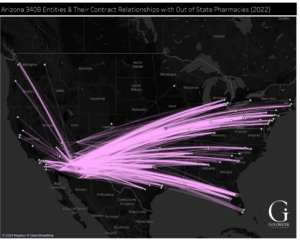6,500!
That’s how many workers have exercised their right to earn a living thanks to Arizona’s first-in-the-nation universal recognition of occupational licenses reform, according to a just-released Goldwater report.
Universal recognition, which the Goldwater Institute enacted in Arizona in 2019, streamlines occupational licensing across dozens of professions by allowing skilled professionals to use their out-of-state experience to quickly obtain a license to work in their new state. Ever since Arizona pioneered this approach to help workers relocate, more than 6,500 professionals have been granted licenses under the reform—in fields ranging from medicine to cosmetology to engineering, according to the report from Goldwater Director of Strategic Engagement Heather Curry and former White House Office of Management and Budget Chief Economist Vance Ginn, Ph.D.
And it’s not just Arizona—universal recognition has become a model for the rest of the nation to follow. Goldwater has already passed this reform in over 20 states, and we’ll continue working to implement it around the country so that more people have an opportunity to pursue their American Dream.
Read Goldwater’s new report here, and read more about universal recognition here.
If The New York Times and fellow leftist cheerleaders repeat something enough times, it becomes empirically true! Or at least that seems to sum up their thinking when it comes to propping up the race-based “diversity, equity, and inclusion” (DEI) efforts taking over campuses and companies across the nation, Goldwater Institute Director of Education Policy Matt Beienburg writes at The Federalist.
This month, the Times cited research that supposedly proves DEI makes students and employees more productive. Yet that very research acknowledges a dearth of empirical evidence that implementing DEI in higher education works as intended. To shoehorn their preferred narrative through, the study’s authors say that certain scholarly publications—which often cite each other’s research—are temporarily cited more frequently by their peers after “diversifying” their staff. Of course, being frequently cited by other (increasingly politically like-minded) publications doesn’t mean a given article is actually any good.
“The New York Times—and the herd mentality of academia’s DEI vanguard—may wish to wrap themselves in a warm blanket of groupthink,” Beienburg writes. “But taxpayers have no responsibility to indulge their narratives—and even less to foot the bill for them in violation of the Constitution.”
Read the rest at The Federalist.
Is a government program meant to help low-income and uninsured patients access cheaper prescription drugs failing the vulnerable Americans it was intended to serve?
A new Goldwater policy report reveals what’s really happening under the 340B Drug Discount Program, which was created to allow hospitals and other entities serving poor, often rural communities to purchase drugs at discounted prices. At issue is whether healthcare entities are selling these significantly discounted drugs at sizable profits to pharmacies around the nation, including in affluent areas. In fact, there is little or no accounting of where the revenues from these sales are going, who is benefiting, or, in some cases, if impoverished patients are getting these treatments but not any associated discounts.
The project’s interactive maps expose these cozy, secretive arrangements in a variety of ways, including the 33 states where these drug treatments are being made available directly from 340B entities located in Arizona, for example.

To view the interactive version of this figure, click above or click here.
As the report from Goldwater Vice President for Healthcare Policy Naomi Lopez and Healthcare Policy Analyst Amanda Hagerman explains, lawmakers who are serious about “doing something” about prescription drug access and prices should make 340B reform a top priority. Program transparency and integrity are the best places to start.
Read the report here.










